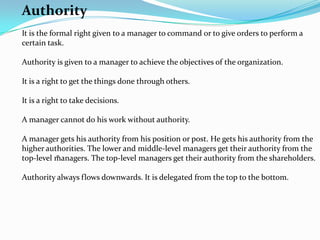
Power and authority
- 1. Authority It is the formal right given to a manager to command or to give orders to perform a certain task. Authority is given to a manager to achieve the objectives of the organization. It is a right to get the things done through others. It is a right to take decisions. A manager cannot do his work without authority. A manager gets his authority from his position or post. He gets his authority from the higher authorities. The lower and middle-level managers get their authority from the top-level managers. The top-level managers get their authority from the shareholders. " Authority always flows downwards. It is delegated from the top to the bottom.
- 2. Power It is a broader concept than authority. Power is the ability or potentials of a person to influence another person or a group to perform an act. It is the ability to influence events. Power can be personal power. A person gets his personal power from his personality or from his expert knowledge. Doctors, Lawyers, Engineers, Programmers, etc. get their power from their expertise and professional knowledge. Power can also be legitimate or official power. This power comes from a higher authority. “Authority is the right to give orders and power to exact (get) obedience."
- 3. Difference Between Authority and Power In management, authority differs from power in the following ways :1. Nature Authority is the formal right given to a manager to make decisions or to command. Power is the personal ability to influence others or events. 2. Flow Authority flows downwards in the organization. This is because it is delegated by the superiors to the subordinates. Power can flow in any direction. Even subordinates have power over their superiors, if they can influence their behavior. So power can flow upwards, downwards or horizontally. 3. Organizational Charts Authority relationships (superior-subordinate relationships) can be shown in the organization charts. Power relationships cannot be shown in organization charts.
- 4. 4. Level of Management Authority depends on the level of management. Higher the level of management, higher will be the authority and vice-versa. Power does not depend on the level of management. Power can exist at any level of management. Even a lower-level manager or a worker can have power to influence the behavior of a top-level manager. 5. Legitimacy Authority is always official in nature. So it is legitimate. Power need not be official in nature. So it need not be legitimate. 6. Position and Person Authority is given to a position or post. The manager gets the authority only when he holds that position. Power resides (lives) in the person who uses it.
- 5. Five Bases of Power In 1959, social psychologists John R. P. French and Bertram H. Raven identified five sources or forms of power from which a person gets power. These sources are now known as French and Raven's Five Bases of Power. The French and Raven's five bases of power are briefly explained as follows:- 1. Referent Power 2. Legitimate Power 3. Expert Power 4. Coercive Power 5. Reward Power 1. Referent Power Referent power is also called as personal power and the power of personality. This power comes from each leader individually. It is the personality of a person that attracts followers. People follow because they are influenced or attracted by the magnetic personality of the leader. The followers admire their leaders and may even try to copy their behavior, dress, etc. John F. Kennedy, Martin Luther King, Dr. Babasaheb Ambedkar and Mahatma Gandhi are the examples of leaders with referent power.
- 6. 2. Legitimate Power Legitimate power is also known as position power and official power. It comes from the higher authority. In an organization, a manager gets power because of his position or post. It gives him the power to control resources and to reward and punish others. For e.g. a chief executive officer (C.E.O) of a company gets legitimate powers because of the position which he holds. 3. Expert Power Expert power is also known as the power of knowledge. It comes from expert knowledge and skills. Expert power means the expert influences another person's behavior. This is because the expert has knowledge and skill which the other person needs but does not possess. Persons like doctors, lawyers, accountants, etc., have expert power because they have expert knowledge and skills, which others require.
- 7. 4. Coercive Power Coercive power is the ability to punish others or to pose a threat to others. Coercive power uses fear as a motivator. The leaders or managers with coercive powers can threaten an employee's job security, cut his pay, withdraw certain facilities, suspend him, etc. The coercive power may have an impact in the short-run. It will create a negative impact on the receiver. 5. Reward Power Reward power is opposite to coercive power. With the help of reward power, the leader tries to motivate the followers to improve their performance. This power enables the leader to provide additional facilities, increase in pay, promotion of the subordinates, etc. The reward power also enables the leader to recognize the services of the subordinate through appreciation.
- 8. Concepts of Authority • Delegated authority • Authority given to subordinate, or lesser, people or organisations to make decisions or principles on their own behalf. • Used to increase administrative efficiency of an orgsn. • Eg junior staff in business orgsns to manage a budget without having to bother managing director. Local council given delegated authority to make law
